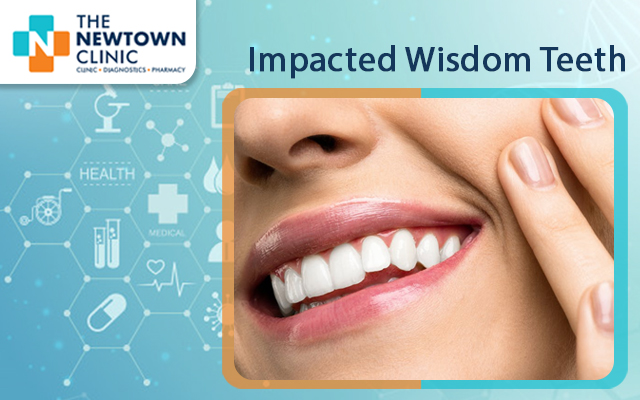The third molars at the back of the mouth, which don’t get enough space to emerge or develop normally, are impacted wisdom teeth. The last adult teeth that are to erupt are the wisdom teeth. These are normally four in number and located at the back of the mouth, two each on the top and the bottom. There can be much pain, damage to other teeth and other dental problems due to its presence. These are also more prone to tooth decay and gum disease compared to other teeth because of difficulty in cleaning. The best dentist near me normally suggests the removal of impacted wisdom teeth to avoid any complications.
Symptoms
When there is an infection in a wisdom tooth or it damages other teeth or causes other dental problems, there may be the following symptoms:
- Jaw pain
- Red or swollen gums
- Swelling around the jaw
- Tender or bleeding gums
- Bad breath
- Difficulty opening your mouth
- An unpleasant taste in your mouth
What Causes Impacted Wisdom Teeth?
When wisdom teeth don’t have enough space to erupt or develop normally, these become impacted. A wisdom tooth may be partially impacted or fully impacted. In both cases, the tooth may:
- Grow at an angle toward the back of the mouth
- Grow at a right angle to the other teeth
- Have a growth at an angle toward the next tooth (second molar)
- Grow straight up and down but remain trapped within the jawbone
Complications Due To Impacted Wisdom Teeth
There can be several problems in the mouth
- Damage to other teeth
- Cysts
- Decay
- Gum disease
Diagnosis
The best dentist in Newtown will properly check your mouth and teeth to confirm the presence of impacted wisdom teeth. He/she will examine that your teeth and gums are in what condition. You must answer the questions about your general health and dental symptoms. Dental X-rays may also be necessary to detect its presence and the signs of teeth or bone damage.
Treatment
Surgical removal
The specialist attached to a dental clinic in Newtown recommends surgical removal of the impacted wisdom teeth if these are causing dental problems including pain. Surgery is necessary when wisdom teeth cause:
- Tooth decay
- Infection or gum disease
- Damage to neighbouring teeth
- Cysts or tumours
The procedure For Removal Of Impacted Wisdom Teeth
The dentist may administer local anaesthesia to numb your mouth, sedation anaesthesia to weaken your consciousness or general anaesthesia to make you fully unconscious. He/she then makes an incision in your gums and removes any bone blocking access to the root of the impacted tooth. The dentist removes the tooth, closes the wounds with stitches and fills the space (socket) with gauze.
After the procedure, you have to take care of the wounds and manage the pain and swelling as per the instructions of the dentist. He/she will normally ask you to use cold compresses to reduce swelling and take pain medications.

